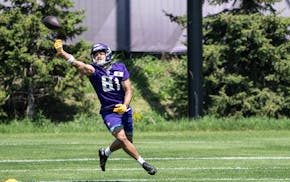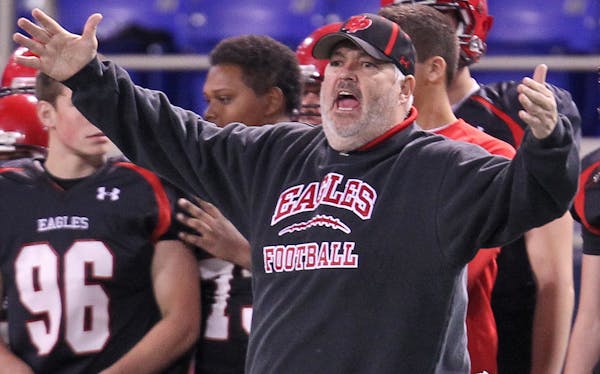Ever wonder who was the bigger influence on Mike Grant's coaching career: his father, Bud, a Pro Football Hall of Fame coach, or John Gagliardi, his college coach who has more victories than any collegiate coach in history?
Neither.
"Certainly my dad and John Gagliardi had big influences, but maybe the most important influence is my mom," Grant said of Pat Grant, who passed away in 2009 at the age of 81 after a life of volunteer community service. "Lots of coaches know X's and O's, and lots of coaches can manage programs."
But it was his mom, he said, who taught him "about communication, about caring. … About helping and wanting to be around to nurture people, to make their life better somehow. That's what I got from her."
And he figures it's mostly those qualities that have helped him become the most successful coach in state high school football history, and the Star Tribune's Sportsperson of the Year for 2014 after leading Eden Prairie to its fourth consecutive large school championship, a record among large schools.
His dad doesn't disagree. Bud Grant talked for an hour about his son's coaching acumen, impressed with Mike's intelligence and preparation. Almost immediately after hanging up, he called the interviewer back.
"One thing I should have said is that Mike's mother was a big influence," Bud Grant said. "He takes more after his mother than me. She really molded Mike. She gets a lot of the credit for whatever he's accomplished, more than me."
Grant, 58, and his staff of veteran assistants — three have been with him since he came to Eden Prairie in 1992 — have built the greatest dynasty of modern state football history. Eden Prairie has won an amazing 10 state titles in the past 19 years. Wayzata is second among large schools in that span with three state titles, and Totino-Grace is second among all classes with six.
"If somebody told me life depended on winning one football game, I'd pick up the phone and call Mike Grant," said former Stillwater coach George Thole, a winner of four state titles himself.
This year's championship run might have been his best coaching job. The team, Grant said, might not be among his 10 best — "or maybe not top 15" in terms of physical talent. "If you lined the [2014] kids up in shorts and T-shirts, you'd say, 'Seriously?' " Grant said.
But this year's team went unbeaten, rallying from behind three consecutive times in the playoffs to secure the championship.
Grant's coaching style is unique in the macho world of football. He jokes with players, disdains hitting in practices and making roster cuts, just as Gagliardi did, and believes "simple words are more powerful" than yelling.
His proudest moment last season, he said, came when almost 50 players decided, on their own, to join him at the funeral of a Minneapolis South football player who drowned shortly before the start of the season. "We talk with the kids all the time about trying to do something good for other people," he said. "Have you done something for people today?"
There are many other daily messages — about admitting mistakes, admonishments against showboating and appeals to work just a bit harder today than the day before — and those who have heeded those talks say their lives were forever altered.
"Football's not life and death with Grant," said Rob Evert, EP class of '94, now an Air Force lieutenant colonel who flew missions in the Middle East after 9/11. "It's about learning life lessons, how to work, how to compete. He knows 99-plus percent of guys will never set foot on a field again after they leave Eden Prairie. That's his lasting legacy."
Many extra miles
Todd Fultz was moved up to the varsity at Forest Lake as a sophomore in 1983, Grant's third season as head coach at the school. Shortly after starting high school, Fultz's younger brother, Timmy, got the diagnosis of a rare, aggressive cancer.
In the difficult months that followed, Grant gave Fultz rides whenever needed, took him to dinners to get the youngster to talk and once after a practice took him to the State Fair, to "make sure that outside of my immediate family I had some sort of release," Fultz said.
Timmy Fultz died during Todd's junior year. The night he passed, Todd was at home with his parents and his high school football coach.
"That's one of those things that's a life moment," Fultz said. "That sticks with you the rest of your life."
When Grant took the job at Eden Prairie in 1992, Fultz was part of the staff. And when Fultz was seriously injured in a car accident in 2008, spending weeks in a hospital and undergoing multiple surgeries, Grant "was never too far away."
Grant is reluctant to go to deep into such personal experiences, saying "that's the work high school coaches do that they don't often get credit for. I don't know if I'm any different than other coaches in that regard."
Perhaps. Providing other coaches take their kids every fall to a senior living complex. Or, on a Halloween dance night, assemble 15 offensive linemen to help move a single mother with small children out of an abusive setting. Or make a cellphone call during halftime of a game to a parent whose son had cancer surgery earlier that day.
Grant has also started a discussion group for students of color that has grown from five members a decade ago to almost 100, helped start a three-night-a-week study table for players that includes a meal after practice and has been known to take groups of special-needs adults to professional wrestling matches.
"He understands completely that football is important, but it's not that important," said Mark Ritter, a high school dean who is the football team's defensive coordinator. "He really uses football and the success he's had to do the greater good. … If a kid is having trouble, Mike will be there. If someone is in the hospital, he's the first one there, and he'll rally the administration."
Teachable lesson: class
There are lessons to be learned on the field, too.
Ryan Iversen is one of the best players in Eden Prairie history, an all-state defensive back and linebacker who in his final two seasons helped the Eagles win 27 consecutive games and two Prep Bowls.
Yet one of his most vivid memories came as a junior after he made what he modestly describes as "a spectacular interception … one-handed, lefthanded " against a very good Apple Valley team. Iversen jumped to his feet and handed the ball to the opposing wide receiver.
"As I'm running off, Mike said, 'Did you say anything to [the Apple Valley] kids?' " Iversen said. "I said, 'No. No, I didn't.' "
That night Grant watched film of the game. Here's what he saw: When Iversen jumped to his feet after the interception, Iversen's head was bobbing and he was clearly verbally taunting as he pushed the ball into the Apple Valley player.
At the next practice, Iversen said he ran a long series of sprints, after each one practicing handing the ball to an official.
"And [Grant] made me write an apology letter to Apple Valley for taunting," Iversen said. "That's him teaching that the game is bigger than you are."
Mark LeVoir, another all-state player who played at Notre Dame and with the NFL's New England Patriots, described Grant's philosophy as "no kid gets left behind. People think it's crazy, but he'll keep 120 varsity kids if you want to put in the effort."
LeVoir said Grant "laid the foundation for the rest of my career " with his emphasis on fundamentals, technique and eliminating mistakes.
The right feel
Bud Grant, who went to four Super Bowls, said his success was predicated on being able to "recognize who's good and put them in the right places where they can do their best," he said. "You can buy a book and get all the plays you want."
If there's a similarity between father and son, Bud said it's in talent and character evaluation. He has watched Mike Grant and his staff make numerous key personnel moves, often in-season, like the time they moved Iversen from safety — where he was all-state as a junior — to linebacker, where he wreaked even more havoc on opponents. Such moves are commonplace on an annual basis.
Mike Grant, in describing his current coaching philosophy, frequently uses this saying: "I know more, I'm sure of less." Meaning, he said, that he's less rigid than when he first came to Eden Prairie, less set in his ways and more open to change.
But to his assistants and players, there remains a genius — a word several used to describe him — about his work. Iversen said he often saw Grant call a running play to start the game, then predicate the rest of Eden Prairie's offense on how the defense reacted and slanted on that one play.
Grant is a bit of a mad chemist, a perfectionist very much like Gagliardi. There have been offseasons, he said, where he watches every play from every game, charting opponents' gains of 5 or more yards to see what happened on the Eden Prairie defense.
Grant also said that he's convinced there is a "a mathematical formula for winning." He claims to have not yet discovered it but knows the variables include no turnovers and touchdowns that count for more than seven points, like punt returns or trick plays.
And he believes, most strongly of all, in this: "You don't have to be a great football player. You just have to play great."
The saying could be inscribed on the 2014 trophy.

As Lynx 'run it back' this season, their bedrock is trio from the Class of '19

Paddack clings to perfection into the sixth inning, pitching the Twins past the Giants
Reusse: Twins play Giants, triggering Mays memories and a question: Can we get the Black players back?

Frost turn away Toronto, even PWHL playoff series at a win apiece

